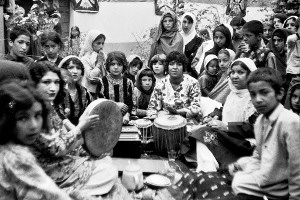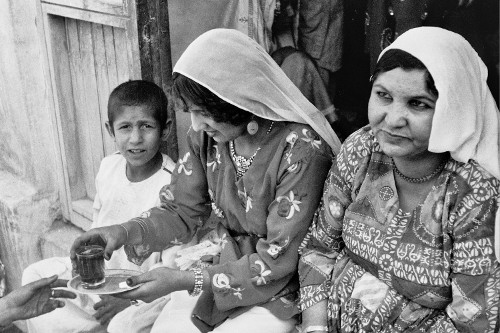Chapter 10
Zainab Herawi
Zainab Herawi (on the right, in a white headscarf) with her band, taking a break
at a wedding party
Herat city, April 1977
Photograph by Veronica Doubleday
Finding Acclaim in the Conservative Islamic Culture of Afghanistan
by Veronica Doubleday
NOTE: There is currently no recording available for this website.
Reason: Smithsonian Institute will not release it without a fee.
Background: Veronica Doubleday made field recordings of Zainab Herawi in the 1970s, then archived them with UNESCO, as material for a CD, believing that "With that Unesco publication I trusted that I was getting my material out to scholars..." (Doubleday, personal communication).
The Smithsonian Institute then acquired the UNESCO collection of Traditional Music and holds the recordings. However, the Smithsonian Institute will not release one track of Zainab Herawi, as recorded by Veronica Doubleday, without payment of a licensing fee. This is an educational project that has not received any funding for licensing fees. Veronica lost the rights to her field recordings that she made of Zainab even though her express mission is to disseminate Zainab's music.
Smithsonian Institute has said that they will be reissuing the CD — Afghanistan: Female Musicians of Heart, UNES08284 — however, no date has been supplied.

Zainab Herawi began her singing career as a child apprentice in the Herat region of Afghanistan in the 1940s, within the context of a class-based society, where singing by women was considered to be morally questionable. Zainab's is a story of unfulfilled fame because, although she was invited to sing for Kabul Radio when twenty-seven, family and background pressures and constraints led to her returning home, where she continued to sing for wedding celebrations. As a series of choices and struggles involving the interfacing domains of family, location, religion, and vocality, her life as local singer with a large family was one of frequent anguish and frustration; yet her songs live on in the narratives and performances of musician and scholar Veronica Doubleday.
Veronica Doubleday: "During the 1970s I undertook fieldwork in the city of Herat, in Afghanistan. There I studied singing and learned to perform Afghan music, working principally with Zainab Herawi. For some ten months, until my departure in 1977, I concentrated on working with Zainab to research women's music and the position of female singers in the local community. We formed a close relationship and Zainab taught me many songs. Also, on occasion I performed as a member of Zainab's band. Since that time I have continued to perform the music I learned in Herat, and I regularly give concerts with my husband John Baily and noted Afghan musicians. Within Afghanistan and the transnational Afghan community I am acknowledged as an accomplished singer with an authentic repertoire of Heratu folk material."

